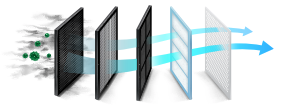Your Guide to Choosing the Right Air Filter
KEEP THE AIR IN YOUR BUILDING SCRUBBED CLEAN
 Are your building’s energy bills going up unexpectedly? Is your HVAC system malfunctioning? If so, then old, faulty, or inefficient air filters could be to blame. We see this relatively often in commercial buildings when we’re called in to investigate HVAC system issues. Filters are easy to overlook, but choosing the wrong filter or leaving an underperforming one in place can wreak havoc on your building’s air quality.
Are your building’s energy bills going up unexpectedly? Is your HVAC system malfunctioning? If so, then old, faulty, or inefficient air filters could be to blame. We see this relatively often in commercial buildings when we’re called in to investigate HVAC system issues. Filters are easy to overlook, but choosing the wrong filter or leaving an underperforming one in place can wreak havoc on your building’s air quality.
AIR FILTER 101
Air filters are a vital part of every commercial building’s HVAC system, along with furnaces and boilers, chillers, cooling towers, air handling units, exhaust fans, ductwork, and steam piping. Most commercial air filters are made from layers of fiberglass stretched across metal gratings. These layers trap and hold contaminants, including mold and spores, pollen, animal hair, bacteria and microorganisms, dust, lint, and more. By catching these contaminants, the filters purify the air circulating through your system, ensuring your tenants can breathe safely.
EFFICIENCY IS VITAL.
Simply having an air filter isn’t enough — you need to choose the right one. Wherever possible, we recommend high-quality air filters. They come at a higher price, but their performance is worth the cost. To pick the efficient, high-quality filters out of the pack, check their Minimum Efficiency Reporting Value (MERV) rating. This rating system was developed by the American Society of Heating, Refrigerating, and Air Conditioning Engineers (ASHRAE) in 1987. It sounds complicated, but the idea is simple: The higher the MERV rating, the more efficient the filter is and the more particles it removes from the air. A filter with a MERV rating between 1 and 4, for example, will capture just 20% of particles between 3 and 10 microns in size, while a filter with a MERV rating of 16 will capture 75% of particles between .3 and 1 micron in size, as well as larger ones. That’s a world of difference!
KEEP YOUR SYSTEM RUNNING SMOOTHLY.
To do their job, air filters need to be chosen well, cleaned often, and replaced regularly. If your building’s filter is clogged with dust, it can increase your energy bills, cause your HVAC system to malfunction or wear out more quickly, and cause contaminants to build up in the duct work. Worst of all, it can leave your tenants breathing dirty air. If you think you’re still having filter problems after a cleaning or replacement, call our team at 281‑448‑1100 to investigate.
